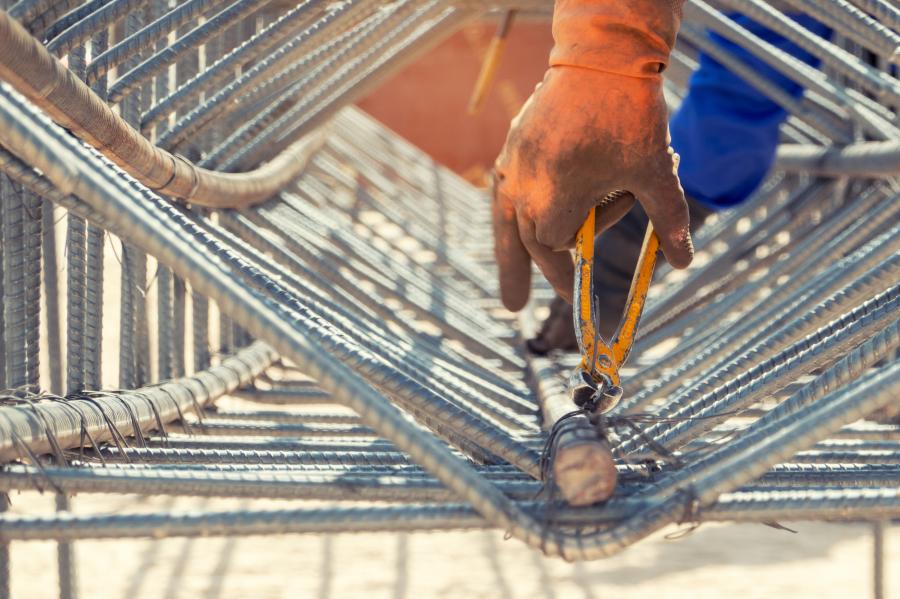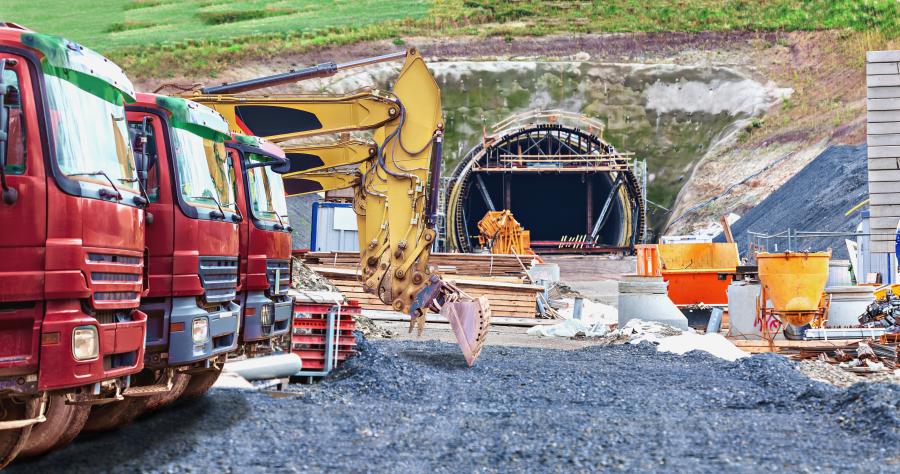Construction industry organizations believe the provision puts unrealistic limitations on construction firms’ ability to source key materials, which they say makes no sense.
Challenges in sourcing American construction materials, coupled with continued supply-chain issues and industry concerns, have pushed the DOT to temporarily suspend President Biden's Build America, Buy America (BABA) requirements. The suspension will allow time for development of new standards for the program, which is part of Biden's 2021 jobs act.
During the program's pause, contractors can research domestic construction material sources and stockpile supplies for federally funded transportation construction projects.
The DOT concluded that avoiding the disruption to civil infrastructure (particularly transportation and transit) projects constitutes a rare and appropriate use of the agency's authority, said John Smolen and Steve Park, Ballard Sphar law firm.
Commonly Used Materials
The IIJA, signed this past November, included a crucial provision that imposes Buy America requirements for construction materials.
The materials list includes stone, sand or gravel, non-ferrous binding agents, plastic- and polymer-based products, glass, lumber and drywall.
Smolen and Park said the rule requires, generally, that all iron and steel, all manufactured products and construction materials used in federally funded infrastructure projects must be produced in the United States.
The AGC outlined domestic sourcing requirements in the guidance, issued in April:
- Steel and Iron — manufacturing processes from the melting stage to applying coatings occurs in the United States;
- Manufactured Products — an end product must be manufactured in the United States and that 55 percent of the total cost of components are sourced from the United States; and
- Construction Materials — all processes for manufacturing construction materials are taking place in the United States.
These items include non-ferrous metals, plastic and polymer-based products, glass, lumber, drywall and more, according to the law partners.
But final guidance on the exact meaning of the term "construction material" has not yet been released, said AGC.
The provision requirements are observed by contractors and subcontractors, project sponsors, builders and design and construction professionals.
The White House also "provided preliminary guidance in an OMB memorandum highlighting that a public-interest waiver may be appropriate where a procuring agency determines that the requirements are inconsistent with other important policy goals," Smolen and Park noted.
The industry reacted quickly. The AGC issued a statement saying the administration's move to "place unrealistic limitations on firms' ability to source key materials" when the industry is struggling makes no sense.
Stephen Sandherr, CEO, said AGC "supports sensible efforts to effectively incentivize the growth of America's domestic manufacturing capacity."
But the association believes the Biden administration is doubling down on failed procurement policies with its new Buy America mandate, he said.
"This is the kind of red tape initiative that undermines American's confidence in the federal governments' ability to effectively use their tax dollars."
He noted that supply-chain shortages are already prompting firms to avoid bidding on new projects.
He cited as an example an Army Corps of Engineers project that received zero contractor bids because of regional concrete scarcities.
Worse, said Sandherr, the new mandate requires individual federal agencies to run waivers by the White House for materials not made in America.
"This means that contractors, in addition to facing a patchwork of inconsistent, and likely conflicting, guidelines from individual agencies' waiver processes, will also have to wait as the highest office in the land verifies them."
He likened the scenario to asking the Department of Education to verify each child's permission slip to miss a day of school.
"Instead of improving infrastructure for the benefit of communities across the nation, firms will have to spend more time waiting for federal officials to decide whether a project is in compliance with the administration's latest layer of red tape," said Sandherr.
Any gains in construction material production the mandate might generate will be offset by the cost of new construction, slower building schedules and hamstrung projects, he said.
"Americans were right to be excited about the potential for the Bipartisan Infrastructure Law to make our economy more efficient, our commutes faster, our water safer and our economy stronger," said Sandherr. "But this new mandate will leave too many taxpayers wondering where the trillion dollars went while they are still stuck in traffic, still hearing about boil water orders and still wondering why we can't have better transit systems."
Slowing Its Roll
The association was happy when in May the DOT proposed slowing rollout of the Buy America requirements to allow for development of enforcement and compliance guidance.
Suspension of provisions was intended to "provide for strengthened enforcement over time," according to the DOT.
During negotiations of the infrastructure legislation, AGC secured exemptions for concrete, asphalt and aggregates from the definition of ‘construction materials,' the association reported.
"AGC supports this move by the department and will voice that during the comment period."
At a time when transportation contractors are still facing historic disruptions to the material supply chain, "it is self-evident that more time and collaboration among industry partners is needed to be able to meet these new requirements," said AGC.
Smolen and Park attribute the waiver to the inclusion of construction materials, which have not been previously subject to these rules.
"USDOT sought comments from affected industry participants as to whether to provide a broad, temporary waiver."
The industry responded and the waiver came about. In doing so, the agency noted it would allow implementation of the Buy America requirements in a way not overly burdensome.
DOT issued the waiver in light of ongoing supply-chain issues and other regional challenges in sourcing domestic construction materials.
"The de-facto transitional period affords USDOT the time to develop the Biden administration's enforcement and compliance mechanisms," said the Ballard Spahr partners.
"It also provides state DOTs the time necessary to update their standards and specifications, allows contractors and industry participants to incorporate the relevant Buy America contract provisions and better informs the FHWA in addressing its noncompliance and oversight processes."
Gauging Industry Hardship
AGC expressed concerns with the Buy America provision back in January, warning that Biden's regulation could delay infrastructure projects funded by the law itself.
"The IIJA provides funding for physical infrastructure like roads, water systems, the electric grid, and more," said the association. "The new and expanded Buy America requirements apply to all federally funded programs and include manufactured products, like iron and steel, and also construction materials used on projects within those programs."
The AGC pointed out, too, that federal agencies had voiced concern over whether project sponsors would be able to complete projects with these requirements as they stand.
The association said at the time it was working with various agencies as well as other industry stakeholders in addressing this issue.
"Many products manufactured in the U.S. do not meet the requirements because some component or material used in production is globally sourced," said AGC. "For instance, a pump manufactured in the U.S. that includes an impeller produced overseas does not satisfy the requirements."
AGC considered EPA's model "successful in getting funds out the door through its state revolving fund programs for drinking water and wastewater projects and still abiding by similar requirements since the Recovery Act of 2009."
In July, DOT published a request for information on the provision requirements that specified construction materials be produced domestically.
The agency wanted to know how the requirement should be interpreted and implemented.
DOT wanted to gauge present availability of U.S.-produced construction materials commonly used and how the requirements might impact DOT-funded projects.
"AGC helped lead an effort with 41 other national organizations calling on the administration to extend the 180-day waiver to ensure that projects are not needlessly delayed," the organization said. "AGC continues to be concerned about the current availability and pricing of construction materials and the unintended consequences that this new provision could have."
The National Law Review noted that various federal agencies have historically implemented their own domestic materials provisions over the years.
Those have included standalone provisions that apply to particular grant and infrastructure projects.
The new guidance, however, is applicable to all federal financial assistance programs where funds are available for infrastructure projects, according to the Review.
This, regardless of whether the funding comes from the IIJA, although limited exceptions might be available for emergency response expenditures, said David Gallacher and Ariel Debin.
New rules and further updates are likely to be formalized in the coming months, they reported.
But if an agency has existing Buy America requirements that are more stringent than these new requirements, then these new requirements may be superseded by the more restrictive requirement.
"Interpreting the government's various requirements can be tricky, especially where compliance with one does not necessarily mean compliance with another," said Gallacher and Debin. CEG
Lucy Perry
Lucy Perry has 30 years of experience covering the U.S. construction industry. She has served as Editor of paving and lifting magazines, and has created content for many national and international construction trade publications. A native of Baton Rouge, Louisiana, she has a Journalism degree from Louisiana State University, and is an avid fan of all LSU sports. She resides in Kansas City, Missouri, with her husband, who has turned her into a major fan of the NFL Kansas City Chiefs. When she's not chasing after Lucy, their dachshund, Lucy likes to create mixed-media art.
Read more from Lucy Perry here.
Today's top stories


















